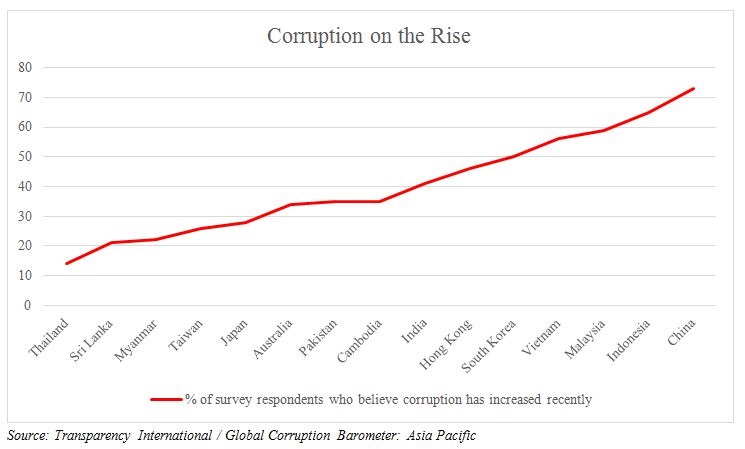9 Measures to Combat Corruption
According to a recent Transparency International survey, bribery and corruption seem to be on the rise in the Asia-Pacific region. This is true even in China, despite the government’s crackdown on corruption. Although police were widely recognized as the most rampant facilitators of bribery, there are a number of steps the private sector can take to help drive systemic change.
with co-authors Michelle Mizutani and Jack Oakley
The contribution of private sector compliance was made even clearer by a new report published last month by Transparency International (TI), People and Corruption: Asia Pacific. According to the report, more than 900 million people across the 16 Asia-Pacific countries surveyed had paid a bribe in the past year when seeking to access basic services such as education or health care. That number equates to more than one-in-four people across those 16 countries.
The report concludes that, whilst some countries are perceived as doing well to combat bribery and corruption (e.g., Australia, Japan, Taiwan and Sri Lanka), others are not (e.g., Malaysia, Vietnam, India and China). Overall public sentiment is that the prevalence of corruption and bribery throughout the region remains endemic. While the report urges governments and individuals to do more to combat corruption, where private sector entities unite in their resolve to root out corruption, the overall effect can be far greater.
Findings: Corruption Prevalent
The report, based on almost 22,000 surveys, found that, overall, only one-in-five people surveyed believe that corruption is on the decline in the region. Amongst other things, the survey asked the question: “Over the past year, has the level of corruption in this country increased, decreased or stayed the same?” In China, the question included the last three years, and 73 percent of those surveyed felt that corruption had increased, despite the corruption crackdown.

Out of six public services about which TI inquired, police are allegedly the most rampant facilitators of bribery. Over 30 percent of those surveyed who came into contact with police in the last 12 months reported that they were required to pay a bribe “either to get the assistance that they needed or to avoid a fine.”
The report reveals that those surveyed believe that “standing up and speaking out” are the best ways to fight corruption, but few people do so for fear of the consequences associated with whistleblowing or because of a lack of reporting channels.
The report offers a number of recommendations for governments — such as delivering on anti-corruption promises through national legislation and enacting public sector codes of conduct — and for individuals — such as facilitating greater protection for whistleblowers. But the report does not emphasize the force-multiplier effect of private sector enlistment.
How Private Sector Organisations Can Assist
In order to help effect systemic change with respect to the bribery and corruption prevalent in the region, one thing the private sector must do in tandem with government authorities is to lead by example. Organisations can help achieve TI’s recommendations by implementing the following remedial measures for combating bribery and corruption:
- Adopt strength in numbers through the formation of industry bodies to communicate, share ideas and engage in consultation with government authorities on matters such as legislative reform in the anti-bribery and corruption sphere to ensure promises are delivered upon;
- Conduct internal bribery and corruption risk assessments reflective of the size and status of the corporation and its operations, and use this information to inform training and compliance controls;
- Adopt best practice policies and procedures internally through the enactment of codes of conduct, anti-bribery/gifts and hospitality policies, together with rules and procedures directed at day-to-day business practices that are assessed as high-risk activities (e.g., client entertainment/hospitality, tendering/subcontracting processes, government projects and so on);
- Implement strong training and compliance programmes to educate employees and contractors about the bribery and corruption risks;
- Establish a reporting hierarchy through the development of organisational frameworks tailored to the needs of your business (such as appointing a compliance officer, establishing unique reporting hotlines and implementing an investigation procedure);
- Protect whistleblowers through the development and implementation of internal policies which afford job security and other protections to those who speak out against organisational corruption;
- Enforce strict sanctions for employees and contractors found to be engaged in bribery and/or corruption;
- Conduct regular and irregular audits to review whether preventative systems in place are reflective of market standard and are functioning as they should be; and
- Employ continuous improvement mechanisms to make necessary amendments to policies and procedures in place based on the results of audits.
We agree with the Organisation for Economic Co-operation and Development that “promoting private sector integrity is to the benefit of companies, governments and everyday citizens who all benefit from a stronger, cleaner and fairer world economy.” By implementing our suggested remedial measures, organisations can work together with governments to stamp out the endemic bribery and corruption highlighted by the report.



 Wendy L. Wysong is a partner at
Wendy L. Wysong is a partner at 





